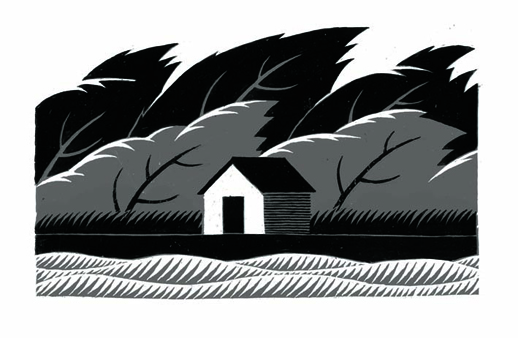 illustration by Jon McNaught
illustration by Jon McNaught
Words by Michael Smith.
An extract from this years Caught by the River book, On Nature.
Walking along the shoreline in the pearly evening light, the room above the tennis courts full of stoner kids rehearsing their floydy tunes, wah wah guitars and jazzy drums floating out of the window, which is open to the sea and the balmy summer evening breeze, the best rehearsal room in the world… past the weather boarded white pub stuck out on its own on the beach, with old white haired ponytailed geezers and Floyd proper on the jukebox; there’s just something about seaside towns and stoners I guess… an old dear on a fold-out beach chair painting the sea view… all the workaday problems you circle round and round, that blinker you and bind you to your worries and routines are slowly shed, out here before the wide open sky, the magnificent distance of the far horizon…
I didn’t mind that I’d followed the warm, beckoning smell of frying cod batter, but missed the best chippy by a whisker; I didn’t mind that the other chippy’s gear was sloppy and not up to scratch; I didn’t even mind that Whitstable had been invaded by swarms of little bugs that got into the hairs on my arms and up my nose every few seconds: here I was, back in my coastal Kentish paradise….
When we bought this hut it was the grand romantic gesture – a second home before we even lived together in a first. I bought my half when I was flush, over-reaching myself as one always does in those circumstances – going through money as if it were a consensual hallucination, a giddy whirl of lobsters and espresso martinis, living on a promise that no one ever made me, and consequently no one ever kept.
Now all the cash is spent and I can’t pay the rent on my London flat any longer, it’s still the grand romantic gesture, in another kind of way: I dream of eking out the rest of the long lean summer in this hut, living on Weetabix and digestives, with five quid fish’n’chips as my treat; I daydream of dangling a line off the dock wall at high tide and waiting for a crab, taking him home in my bucket, cooking him on the Campingaz stove, cracking him open and eating him – one of the sea’s great bounteous luxuries for nowt; in this way beach hut life transforms poverty into something glorious; the hut was the glory of my flush, flashy times, and now it’s the glory of my poverty.
I no longer taxi back from dirty Dean Street in Soho and pass out at half three in the morning, then wake up hungover at lunch time. I go to sleep when it gets dark, and am woken when it gets light again. The day-to-day basics come into wonderfully sharp focus:
The sea is as good a bath as any. You only notice how grubby your clothes and hair are when you’re fresh off the train at Victoria and worried about being smelly on a London bus. Recently I’m in that predicament less and less. I wash the dishes in a Tupperware bucket before the vast open sky, and it takes on the air of a sacred cleansing ritual; the theme here is a cosmic one – man and universe – and there is very little scope for anything in between.
I have no electricity: the e mails remain unread, the mobile phone stays off. I like to imagine I am thick in the heart of this solitude, like Thoreau thick in the heart of his forest, far from the entrapments of modern society, but this of course is not true – I am a ten minute walk from the Co Op, which shuts at ten, which I can stroll up to for fresh supplies of millionaire shortbread or raspberry pop. I am five minutes from the Old Neptune pub, where I can sup a Guinness watching some gnarly old Kentish blues band. Kate comes at the weekend, bringing company, kindness and food parcels. But still, amongst these comforts that keep me joined up to the world, the effect is the same: empty space enough to find a kind of peace for myself, which is also where the words come.
I lived a solitary seaside existence marked by poverty once before, when I was young, and lost, and didn’t know what to do; this time round is markedly different in one important respect: the wind howls, the walls creak like they might cave in, the candlelight flickers, I write all this down, and I am happy. I thank my lucky stars for this seaside retreat – the lucky stars that line up in the vast, sprawling estuarine sky and stand guard above my tiny weather beaten hut.